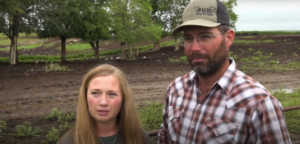Charles and Heather Maude, a farming couple from western South Dakota, have been indicted on theft of federal property, with charges brought against them in June 2024. But their case has sparked outrage from agricultural organizations nationwide and has earned the support of a U.S. senator.
The indictment accuses the Maudes of unlawfully taking and converting approximately 50 acres of national grasslands managed by the U.S. Department of Agriculture for their own use. The land in question was used for cultivation and grazing, and the property’s value exceeds $1,000. If convicted, they each face up to 10 years in prison and fines of up to $250,000, under a federal statute that addresses use of government land without permission.
The legal dispute centers around a longstanding boundary between Maude’s property and land managed by the U.S. Forest Service. The contested fence line, which the USFS claims represents theft, has existed for generations.

A neighbor, Scott Edoff, told Tri-State Livestock News that the Maudes have been ranching adjacent to the disputed land since 1910, with a grazing allotment in good standing since the U.S. Forest Service’s establishment.
Edoff, who has a history with the South Dakota Stockgrowers Association and the state’s Public Lands Council, expressed shock at the charges. He explained that the Maudes’ property surrounds the disputed land on three sides, with the Cheyenne River forming the fourth boundary. He noted that the Maude family has managed parts of this land for decades, including constructing an irrigation ditch in the 1950s with USFS approval.
In recent years, Charles and Heather Maude upgraded their irrigation system, with part of the equipment passing over the contested land. The family had tried to purchase the disputed parcels in the 1950s, and despite years of grazing agreements with the USFS, they were never told to cease farming the land.
The situation escalated after USFS special agent Travis Lunders initiated contact with the Maudes in March 2024, following a complaint regarding a fence that allegedly blocked access to Buffalo Gap National Grasslands. A subsequent survey of the land was agreed upon in May 2024, but just over a month later, the Maudes were indicted without receiving the survey results.

The charges against the Maudes have sparked widespread criticism, with industry leaders and lawmakers questioning the USFS’s approach. U.S. Sen. Mike Rounds highlighted the discrepancy between the cooperative plan originally agreed upon and the aggressive legal action taken. In a letter to U.S. Secretary of Agriculture Tom Vilsack, Rounds called the indictments for theft of government property served on the Maudes an overzealous prosecution of a ranching family.
Public Lands Council Executive Director Kaitlynn Glover and other industry figures argue that the criminal charges are an extreme response to what should have been a routine boundary dispute, suggesting alternative resolutions such as the Small Tracts Act, which allows the USFS to sell or exchange small, isolated parcels of land.
Support for the Maudes has grown within the ranching community and beyond. Many organizations, including the National Cattlemen’s Beef Association and the PLC, have condemned the federal agencies’ actions, emphasizing the Maudes’ long history of responsible land stewardship.
“It didn’t take us long to go through the paces to get to the bottom of what was happening in South Dakota and that conversation was received in exactly the same kind of anger we received it when we took it up to Capitol Hill and started talking to folks on the Natural Resources Committee,” NCBA Vice President of Public Affairs David Lane said. “Chairman [Rep. Bruce] Westerman (R-Ark.) and his staff are acutely aware of this long history of abuse by the Forest Service in this part of the world.”
Lane called for the immediate dismissal of the criminal charges against the Maudes, emphasizing that ranchers and permittees who relate to the Maude’s situation should be aware that a strong movement for justice is already underway.
“We’re right here,” Lane said. “We are in the right. The law is on our side and when the law is on your side, and when you are right and when you have structures in place inside the industry to deal with these kinds of things, you use that authority, you use that platform to go through those channels and get justice and that’s the process we’re going to go through here.”
The case has drawn attention to broader concerns about government overreach and the treatment of ranchers by federal agencies.
“The Maude family are public lands permittees in good standing, and they have always been the first to step forward as constructive partners in federal land management,” said Mark Roeber, PLC President. “This case is a prime example of what can happen when federal agencies view ranchers as enemies, rather than partners. I urge the U.S. Forest Service to rethink their plan to slap handcuffs on these hardworking ranchers and instead pursue an alternative resolution to this issue.”
The Maudes, who are facing charges separately, have both had to hire legal representation. To help with their legal expenses, a Maude Legal Fund was established through First Interstate Bank, P.O. Box 98, New Underwood, S.D. 57761, as well as a GoFundMe that has raised $6,887 of the $77,000 goal since its creation by Katie Dirkensen five days ago.


